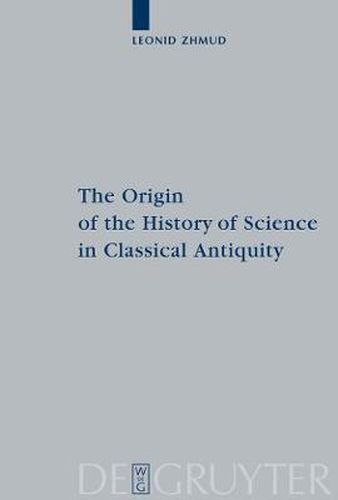Readings Newsletter
Become a Readings Member to make your shopping experience even easier.
Sign in or sign up for free!
You’re not far away from qualifying for FREE standard shipping within Australia
You’ve qualified for FREE standard shipping within Australia
The cart is loading…






This is the first comprehensive study of what remains of the writings of Aristotle’s student Eudemus of Rhodes on the history of the exact sciences. These fragments are crucial to our understanding of the content, form, and goal of the Peripatetic historiography of science.
The first part of the book presents an analysis of those trends in Presocratic, Sophistic and Platonic thought that contributed to the development of the history of science. The second part provides a detailed study of Eudemus’ writings in their relationship with the scientific literature of his time, Aristotelian philosophy and the other historiographic genres practiced at the Lyceum: biography, medical and natural-philosophical doxography.Although Peripatetic historiography of science failed in establishing itself as a continuous genre, it greatly contributed both to the birth of the Arabic medieval historiography of science and to the development of this genre in Europe in the 16th-18th centuries.
$9.00 standard shipping within Australia
FREE standard shipping within Australia for orders over $100.00
Express & International shipping calculated at checkout
Stock availability can be subject to change without notice. We recommend calling the shop or contacting our online team to check availability of low stock items. Please see our Shopping Online page for more details.
This is the first comprehensive study of what remains of the writings of Aristotle’s student Eudemus of Rhodes on the history of the exact sciences. These fragments are crucial to our understanding of the content, form, and goal of the Peripatetic historiography of science.
The first part of the book presents an analysis of those trends in Presocratic, Sophistic and Platonic thought that contributed to the development of the history of science. The second part provides a detailed study of Eudemus’ writings in their relationship with the scientific literature of his time, Aristotelian philosophy and the other historiographic genres practiced at the Lyceum: biography, medical and natural-philosophical doxography.Although Peripatetic historiography of science failed in establishing itself as a continuous genre, it greatly contributed both to the birth of the Arabic medieval historiography of science and to the development of this genre in Europe in the 16th-18th centuries.